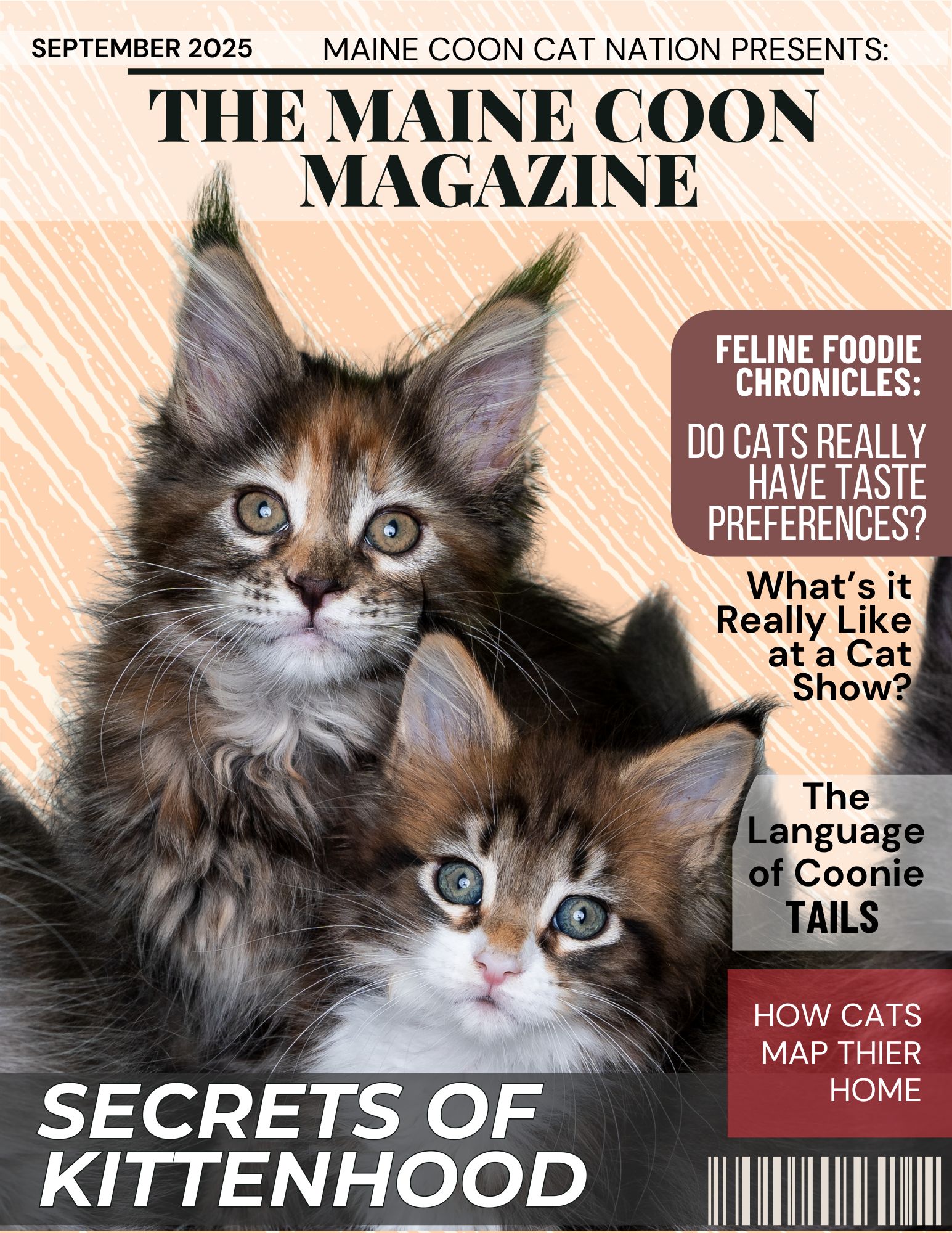- Home
- Maine Coon Care
- Winter Weather
Cold Weather Pet Safety
Top 10 Winter Weather Tips
Brrr! It's cold outside! Even for indoor cats, the deep-freeze of winter brings some cold weather pet safety and comfort precautions.
If you like this, you'll love our fun, free Daily Digest!

I was driving this morning and as I took in the white, forbidding landscape I wondered if there were any pets nearby who were out in the cold.
Here in Maine, temperatures cab dip well below zero. Here are our top ten cold weather pet safety tips!
Cold Weather Pet Safety Tip #1:
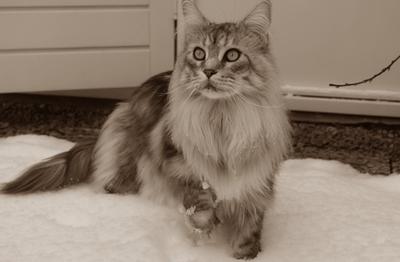 Viper in the snow
Viper in the snowBeware of Hypothermia and Frostbite:
The elements present their own direct dangers.
We don't usually give it much thought but even with all that fur, animals can get frostbite.
Areas with little to no fur cover such as toes and ears are most commonly frostbitten.
Signs of frostbite include white or pale skin, then after warming up it becomes reddish or irritated looking. It's painful and later peels off.
Hypothermia may occur if a cat gets wet out in the cold. Signs include listlessness, shivering and low temperature. It's imperative to warm him up gently (don't use a hair dryer, as it can burn him) and seek veterinary treatment. Risks include collapsing into a coma.
Preventing hypothermia and frostbite starts with limiting your cat's exposure to the elements.
If your furry family members enjoy outdoor time, consider investing in a pet-safe heated pad for their favorite outdoor spots or a well-insulated outdoor shelter with straw bedding for warmth.
Avoid blankets or towels in outdoor shelters, as these absorb moisture and can freeze, making conditions worse.
For cats who refuse to stay indoors, you can also try pet-safe winter coats to provide additional insulation.
Always dry your cat or dog thoroughly if they get wet from snow, and watch for warning signs of frostbite on their ears, paws, and tails, such as discoloration or swelling.
A little extra grooming during the winter can also help, as removing matted fur allows their coat to insulate more effectively.
How to avoid hypothermia and frostbite? It's best to keep your Coonie indoors, especially during dangerous, frigid winter weather.
Cold Weather Pet Safety Tip #2:
Use Extreme Caution With Antifreeze
Antifreeze is recognizable by it's bright green color. During winter, drivers may need to refill it more often, leading to spills, open containers, loose covers on containers, and vehicle leaks. It has a sweet taste that appeals to most animals. It is poisonous and deadly.
This is one of the most common types of pet poisoning. Signs come on suddenly and include tremors, vomiting, twitching muscles or eyes, wobbly walk, seizures and more.
Saving your cats life depends on getting him immediate veterinary care. There are treatments and procedures your vet can do to slow the absorption of the poison and try to flush the body of it.
To reduce the risk of antifreeze poisoning, look for pet-safe antifreeze products that contain bittering agents to deter animals from ingesting them.
These are widely available and can make a big difference in keeping pets safe.
Always clean up any antifreeze spills immediately and thoroughly, and store containers in a secure location where your cat cannot access them.
Regularly check your car for leaks, as even a small puddle in your driveway or garage can be deadly.
If you suspect antifreeze poisoning, don't wait - immediately contact your veterinarian or a pet poison control hotline for guidance.
The faster you act, the better the chances of saving your cat's life.
Cold Weather Pet Safety Tip #3:
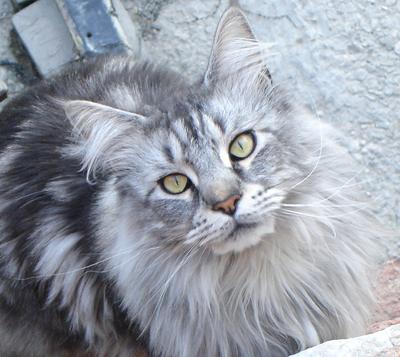
Take Care When Starting The Car
Many small animals, including cats, take refuge under the hood or in other hiding places.
When the engine ignites, and the fan belt starts up you can imagine what might happen.
It's recommended that we give any neighbor cats (and even chipmunks and squirrels for that matter!) a heads-up by banging on the hood before firing up the vehicle.
Banging on the hood of your car before starting the engine might seem unnecessary, but it's a lifesaving habit in snowy climates.
During winter, small animals like cats, squirrels, and even birds seek warmth in engine compartments, especially after a vehicle has been parked for a while.
This happens more often than you might expect, as the warmth radiating from the engine can be irresistible during frigid nights.
Make it part of your routine to knock on the hood or tap firmly on the side of the car each time you get in.
Doing so ensures you give any hidden animal a chance to escape before the engine starts. For added precaution, honk the horn once to scare off animals who might not hear the knocking.
If you live in an area with feral cats, encourage your neighbors to adopt this practice as well - it’s a small gesture that could prevent a tragic accident.
Cold Weather Pet Safety Tip #4:
Avoid Drafts
Even inside, we humans tend to bundle up with sweaters, blankets etc. Make sure your favorite furry friends have a warm cozy place too!
You can get creative with a homemade cave-like hideaway that protects from drafts. Some soft warm blankets are always welcome!
I used to provide my cat Bianca with a warm water bottle in her bed each cold winter night.
Cold Weather Pet Safety Tip #5:
Remember Arthritis
Cold weather can cause elderly kitties to feel their ailments even more than usual. The discomfort of conditions such as arthritis may be more pronounced.
Cold Weather Pet Safety Tip #6:
Careful On Car Rides
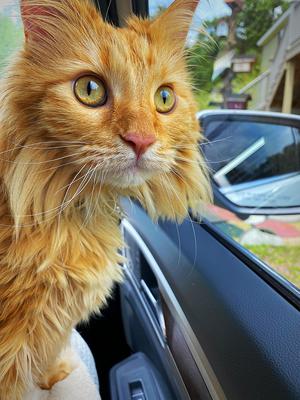
Cats aren't in the car very often. But whether it's a ride home from the vet, a vacation or road trip, or one of those rare kitties who likes rides, they sometimes travel.
If you need to make any stops, don't leave Fluffy alone with the car off.
Many people aren't aware, but the interior of vehicles cools off fast, and acts like a refrigerator, holding in the cold air.
Cold Weather Pet Safety Tip #7:
Stock Up
Even if you have strictly indoor cats and an always-warm home, what about a power outage?
Along with flashlights and batteries, canned goods, water and other items, it's a good idea to keep plenty of your cat's basic necessities on hand during cold weather.
You likely won't be able to drive out for cat food or kitty litter during a blizzard or ice storm!
Cold Weather Pet Safety Tip #8:
Microchip
Microchipping is always a good idea. In winter, kind-hearted cat lovers might be more likely to take in a seemingly lost kitty.
This form of identification will make it easier to find your Coonie and get him back home.
Even our 100% indoor Maine Coons are microchipped, since they could slip out the door and then take off, whether in fright from a neighborhood dog or in pursuit of a chipmunk.
Cold Weather Pet Safety Tip #9:
Watch Out For Salt and De-Icers
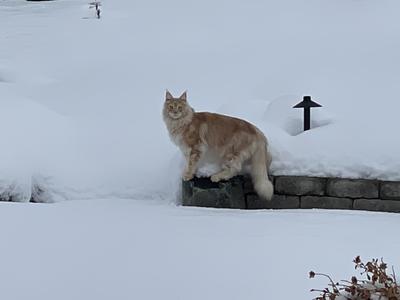
We tend to think of dogs paw pads being affected by salt and de-icers in winter, as they are out perusing the sidewalks much more than their feline friends.
But cats' paw pads are vulnerable too. Salt exposure on paw pads can lead to painful chemical burns.
Licking rock salt off their paws, as cats are more prone to doing, can lead to dehydration, kidney failure, and pancreatitis, as well as burns to the mouth and throat. Additionally, most de-icers are poisonous if licked and ingested.
Cold Weather Pet Safety Tip #10:
Help Out Neighborhood Animals
Our last tip is not for your Maine Coon, but for other animals in your area! If there are feral kitties, consider making sure they have food, water and shelter.
Shelters for feral cats should be not too large, so they can retain body heat, and not include blankets or cat beds as they actually absorb body heat and wick it away from the body rather than reflecting it back to the cat.
Also, if you find a concerning situation of a pet kept or tied outdoors for extended periods in freezing weather, consider reporting it.
Take a photo with your phone, document the times and temperatures, and share the info with animal control. If it continues, you may even want to follow up.
DIY Feral Cat Shelter:
Supporting feral cats during winter is a compassionate way to help vulnerable animals survive the harsh conditions.
One of the most effective ways to assist is by building simple, insulated shelters. Here's how to make one with common materials:
Materials Needed:
- A large plastic storage bin (Rubbermaid or similar)
- A smaller plastic bin or Styrofoam cooler to fit inside
- Straw (for insulation; avoid blankets or towels)
- Duct tape and a utility knife
- Optional: Mylar thermal blankets for added insulation
Steps:
- Cut a 6–8-inch round or oval hole near the bottom of one side of the large bin. This will be the entrance.
- Insert the smaller bin or cooler inside the larger one, aligning the openings. Ensure the smaller bin provides extra insulation by filling any gaps between the bins with straw.
- Line the inside of the smaller bin with straw for warmth. Avoid materials like blankets or fabric, as they retain moisture and freeze.
- Secure the lid on the large bin, using duct tape if necessary, to ensure it’s weatherproof.
- Place the shelter in a discreet, safe area, such as under a porch or against a wind-protected wall.
Tips for Heated Water Sources:
Providing unfrozen water for feral cats can be challenging in freezing weather. Here are some tips:
- Use Heated Bowls: Purchase outdoor heated water bowls, which are available at pet stores and online. These plug into an outlet to keep water from freezing.
- DIY Thermal Water Bowl: Place a smaller metal or ceramic bowl inside a larger Styrofoam container, filling the gap with insulation like straw or foam. This setup slows the freezing process.
- Check Often: Refill and check water sources daily to ensure they remain accessible and clean.
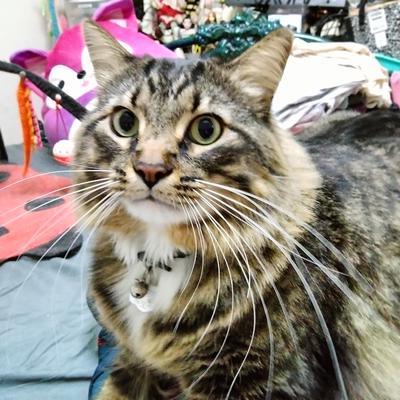
By creating warm shelters and providing water, you’re making a significant impact on the survival and comfort of feral cats in your community.
For those who want to go a step further, consider connecting with local TNR (Trap-Neuter-Return) programs to help manage feral populations humanely.
Bonus Cold-Weather Tips For Pet Owners
Winter brings unique challenges for pets beyond frostbite and antifreeze risks. Here are four extra concerns to keep in mind:
Space Heater Safety
When temperatures drop, space heaters often come out. While they help us stay warm, they can pose risks for pets. Cats may curl up too close to the heat, risking burns.
Portable heaters can also be knocked over, causing a fire hazard. Use models with safety features like automatic shut-offs.
Keep heaters out of reach, or block them with a protective screen.
Rodent Poisons
Winter often drives rodents indoors, leading to increased use of rodenticides. These are deadly for cats if ingested, even in small amounts.
Cats may also eat a poisoned rodent, risking secondary poisoning.
If you must use traps or bait, opt for non-toxic alternatives and place them where your pets can’t reach them.
Dry Skin and Coat Care
Cold air and indoor heating can cause dry, flaky skin in cats. Brush regularly to remove dead hair and improve circulation.
Consider adding omega-3 supplements to their diet for healthy skin and fur. A pet-safe humidifier can also help combat dryness in your home.
Indoor Enrichment
Indoor cats need activities to stay happy during long winter months.
- Use puzzle feeders to keep their minds engaged.
- Place perches by windows for bird watching and natural light.
- Rotate in new toys, or even build a play area, to prevent cabin fever and encourage exercise.
Prevention & Emergency Planning
Winter weather can bring unexpected challenges. Being prepared ensures your pet stays safe, no matter the situation.
Emergency Evacuation Kit
Create a winter-specific emergency kit for your pets, in case you need to evacuate with due to natural disaster. Include essentials like extra food, water, and any medications.
Add warm blankets or bedding to keep your cat cozy during power outages or evacuations.
Don’t forget a carrier, a portable litter box, and some toys to reduce stress. Keep this kit ready and easily accessible.
Signs of Exposure
Cold exposure can quickly turn dangerous. Watch for these warning signs of hypothermia and frostbite:
|
Condition |
Signs |
What To Do |
|
Hypothermia |
Shivering, lethargy, cold skin |
Wrap in warm blankets. Seek veterinary care. |
|
Frostbite |
Pale or white skin on ears, paws |
Warm gently with a towel. Avoid direct heat. |
Hypothermia
Signs:
- Shivering, lethargy, cold skin
What To Do:
- Wrap in warm blankets. Seek veterinary care.
Frostbite
Signs:
- Pale or white skin on ears, paws
What To Do:
- Warm gently with a towel. Avoid direct heat.
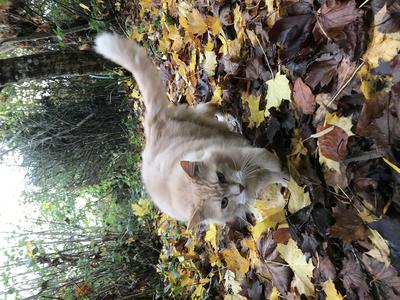
If you notice any of these signs, act quickly. Warm your pet gradually, using blankets or warm towels.
Never use direct heat like a hairdryer, as it can burn their skin. Then, contact your veterinarian for immediate care.
By planning ahead and knowing the warning signs, you can protect your pets during even the harshest winter conditions.
Printable Cold Weather Pet Safety Checklist
Winter weather can be challenging for pets.
This printable checklist summarizes cold weather safety tips to keep your furry friends safe and cozy all season long.
Keep this reference handy for quick and easy access!
Cold Weather Safety Tips
1. Beware of Hypothermia and Frostbite: Keep pets indoors during frigid weather. Watch for pale skin or shivering.
2. Use Extreme Caution With Antifreeze: Store it safely and clean up spills immediately. It's toxic to pets.
3. Bang on the Hood: Tap the car hood before starting the engine to protect animals seeking warmth.
4. Avoid Drafts: Provide a cozy, warm space with blankets or a draft-free hideaway for your pet.
5. Care for Arthritis: Cold weather can worsen arthritis. Ensure older pets have warm bedding and easy access.
6. Drive Safely: Never leave pets in a cold car. The interior can cool down dangerously fast.
7. Stock Up: Prepare for emergencies with extra food, litter, and essentials in case of a storm or outage.
8. Microchip Your Pets: Ensure they can be returned quickly if lost, especially during snowy conditions.
9. Watch for Salt and De-Icers: Clean paws after outdoor time to avoid burns or ingestion of harmful substances.
10. Support Feral Cats: Build shelters using plastic bins and straw. Provide fresh, unfrozen water daily.
11. Dry Skin and Coat Care: Use omega-3 supplements or pet-safe humidifiers to combat dry skin caused by heating.
12. Indoor Enrichment: Keep pets active with puzzle toys, window perches, or new games to avoid cabin fever.
13. Emergency Kit: Include extra food, water, medications, blankets, and a portable litter box for winter readiness.
14. Recognize Exposure Signs: Learn hypothermia and frostbite symptoms. Warm pets gradually and seek vet care.
Do you live in a cold-weather winter climate area? If so, what precautions do you take to keep your Maine Coon safe and warm during a polar-like period?
Top of Cold Weather Pet Safety Tips
« Back to Maine Coon Cat Care
